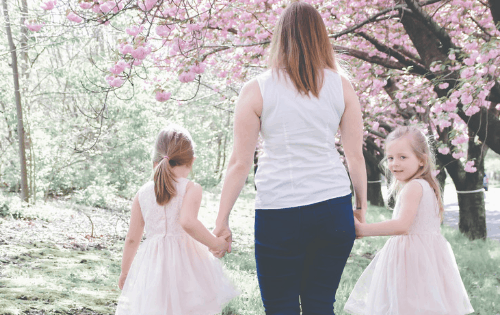A few years ago, I attended a wedding with my whole family. It was outdoors on a hot day. My husband and I were battling heat while trying to keep three kiddos still, quiet, and entertained. Not an easy task.
The minister stood up to say a prayer. Included in his prayer, he said, “May we always be mindful of the needs of others.” That line has stayed with me ever since.
I wasn’t sure why this simple phrase struck a chord so deeply within me. Probably because one of my core values is loving others. I took a self-discovery test as part of my life coaching training and one of the questions was “What is one thing you think is beautiful about the world?” My answer: People helping people.
As a Christian, serving others needs to be one of more core values. After all, Jesus said in John 15:12, “My command is this: Love each other as I have loved you.”
Values vs Actions
I think the phrase “May we always be mindful of the needs of others” rang in my head because I recognized that it was deeply important to me, but also that I was not living that out in my life. I was living a mostly self-centered life. Well, more accurately, I was living a family-centered life. My thoughts of “the needs of others” extended only to my children and less frequently (I’m ashamed to add), to my husband.
Of course, as a wife and mom, my primary concern is going to be for my family. I’m not saying I was wrong in this way. However, I was at a point in my life (where I continue to be now) where I felt content. I have a great work-life balance, a healthy family, and stability. I’m fortunate enough to genuinely enjoy my everyday life.
I say none of this to gloat. The opposite actually — I was at a point in life where many of my dreams and goals had come true and I felt at peace.
But, despite these blessings, I wasn’t doing anything to bless those around me (other than my family, that is). It occurs to me only now that what I felt as I heard those words was conviction. Guilt and revelation.
I would love to say that I changed drastically from that moment on but that is not what happened. Instead, I lived that next day just as I had been living the day before. Life is busy and distractions rampant, so yes — I shamefully admit — I was immediately sucked right back into my own small world.
A Story About the Awareness (or Unawareness) of Others
Allow me to share a funny story with you that illustrates this concept well.
My oldest two girls are 16 months apart in age. They don’t know what life is like without one another. My second, Evy, has never lived without her big sister, and big sister, Elyse, was too young when Evy was born to remember what being an only child was like. As far as they know or remember, they have always been together.
Elyse started preschool a year before Evy. On the days that Elyse had school, Evy and I normally would go in together to collect Elyse. One particular day, my sister was at my house during pick-up time, so I left Evy with her while I made the quick trip to pick up big sister.
Elyse acted the same way she did every time I arrived at her school. She chatted excitedly about her day and asked me what we were going to do next.
It wasn’t until she was strapped in her car seat and I had already driven out of the parking lot when she looked over at her sister’s empty spot and yelled, “Mommy! Evy’s not in her car seat!”
I laughed out loud and explained that Evy had not been there the entire time and it was extremely silly it was for her to not have noticed until then.
Later, as I reflected on this incident, I realized that I too was regularly guilty of this type of unawareness.
A More Painful Story of My Own Lack of Awareness
I had a best friend in high school named Shannon. My friendship with Shannon helped my shy, insecure self to come out of her shell during high school. She was our class clown (literally, we voted on this).
Shannon spent most of her time on the edge of the rules to solicit laughs from others. She was always full of energy. And she always knew how to make me smile.
For a while, we were completely inseparable. We lived close to one another and often spent nights at each other’s homes (even living together for a while), we worked together, and attended school and church together.
Unless we had been physically conjoined, I don’t think we could have seen each other more often than we did.
Imagine my surprise when one day, Shannon revealed to me that she had been battling depression and harming herself. I was 100% stunned by this discovery.
I had no inkling whatsoever that my dearest friend — who I spent nearly all my time with — was in such a dark place.
How could I have been utterly oblivious to my friend’s pain? I asked myself that question as a teenager and even now, it completely baffles me how I could have missed something so close to me.
Yes, Shannon hid her condition well, as hurting people often do. But I believe that had I been more aware, more probing, more conscious of my friend’s true feelings, I would have seen the truth. I probably would have seen it from a hundred miles away had I given it a second glance.
But I saw what I wanted to see in Shannon’s life. I saw a happy, carefree teenage girl who lived to make others laugh. I wanted to believe that was all there was to her. And I couldn’t have been more wrong.
Taking People for Granted
How often do we take the people around us (including the ones we see the most often) for granted? They become such a regular staple in our lives that at some point we might stop seeing them.
Maybe not to the same extent as Elyse did (literally not noticing that her sister was absent), but how often do we stop really seeing people? Below the surface, where the hurt and the needs hide?
Even now as an adult, I’m all too often caught up in the drama inside of my mind. Imaginary deadlines, chores… you know, the super urgent but not actually important tasks of being a mom and wife.
And while certain tasks truly do need to be done, my mind is prone to building up unnecessary commotion surrounding them.
This “mind fog” causes me to miss out on too much. And seeing others through that fog? Nearly impossible.
Through some prayer and self-reflection, I have been able to identify this problem in myself. It required some effort (and some God-given grace), but I can now recognize when am spending too much time in my head and creating chaos that exists only in my imagination.
Focusing on the needs of others helps me to step out of this and back into reality.
As time passed after that wedding, I kept remembering the words, “May we always be mindful of the needs of others.” That phrase kept finding its way through my distractions to the forefront of my mind.
Becoming More Mindful of the Needs of Others
Here’s what I’ve decided. To become more mindful of others, we need to intentionally “get out of our heads” and notice the people around us.
As simple as this idea is, it’s far from easy. It takes work and mercy on ourselves as we inevitably get wrapped back up into our thoughts and worries daily.
Ask God to help you notice the people around you. Ask him to help you see what he sees and for your heart to be broken by what breaks his heart.
If God commands us to love one another, he will surely help us fulfill this command. We need only ask.
A Golden Rule for Moms
We all know the Golden Rule, to “Do unto others as you would have them do unto you” or “Treat others as you would like to be treated.”
I am not trying to improve this rule (which can be traced back to Jesus’ Sermon on the Mount), but I have a suggestion for us mamas to consider.
What if, as moms, we try to “treat other people as we would have them treat our children.” How might following this rule change how we see others? We all wish better for our kids than we do for ourselves, don’t we?
Consider this: If your child went through a traumatic experience and consequently acted out in public, how would you desire onlookers to react? Would you prefer they view your child with compassion or with disdain and disapproval?
Let’s at least attempt to give people the benefit of the doubt when their behavior is nasty. Let’s try to respond with grace. Let’s think about what terrible event (or series of events) must have happened in their life to lead them to this point. Let’s try to picture them as the innocent child that they once were.
The Golden Rule in A Broken and Sinful World
As a Christian, I believe that we live in a broken and sinful world full of broken and sinful people. These people don’t need my judgment and disdain, they need Jesus.
And while I can’t make them believe that he is alive and real and that he loves them, I can show his love through my own actions and behavior.
This type of radical love and grace is only possible through me because I have been shown radical love and grace. I, myself, am a wretched sinner who is often self-centered, self-promoting, short-tempered, and so much more.
But God has seen past these shortcomings and allowed me to be made right with him through the gift of his son. If I believe that — like really, really believe that — how can I not extend grace to those around me? (see the Parable of the Unforgiving Debtor in Matthew 18:21-35)
I’m not giving everyone a pass here. I don’t think we must always allow these people in our lives where we are vulnerable to be hurt by them.
But I am suggesting that those who act badly have probably seen quite a bit of nastiness directed toward them and maybe — just maybe — what they need is a little grace. (see Luke 19:1-10)
I’m not suggesting that you abandon your own needs or desires, or that you don’t protect yourself from harm. But I challenge you to see these people the way God sees them. Love them, despite their actions, and pray for those who hurt you (Matthew 5:44).
Are You a Naturally Thoughtful Person?
I wish I could say I was naturally a thoughtful person but the truth is that I’m not.
I notice and admire that trait in the people around me. I see people who help at the first opportunity and are always one step of others, offering a helping hand before it’s even requested.
It’s amazing to me that some people seem to be wired this way.
If you are not naturally a thoughtful person, you’ll need to make an effort to be more mindful of the needs of others. Try to consider how you can add value to those around you without needing to receive anything in return.
It might seem overwhelming if you already feel like you’re drowning, but start small. Here are some ideas:
- Call up a friend and see how they are doing.
- Compliment a stranger.
- Send a nice message through social media.
- Ask an acquaintance how they are (and really listen).
- Follow up with someone about the last thing they told you.
- Make the shy person in the room feel comfortable.
- If you see something small at a store that would brighten someone’s day (and you can afford it), buy it as a surprise, no-occasion-needed gift.
- Check in on your friends who are going through difficult times (even the “strong ones”).
Be the kind of friend you want your children to have someday.
But most importantly, notice the people around you — the ones you see regularly and the ones you don’t.
If you see a need, meet it. If you have the opportunity to extend kindness, do it. Try to see past happy exteriors and discover what’s going on underneath the surface.
As a result of noticing and serving others, you’ll soon notice that you’re not only making others happier but that you are happier yourself.
But my challenge to you is this…
Don’t do it for you. Don’t just help someone to feel good about yourself or to look good to others. Do it because it’s the right thing to do.
I challenge you to be mindful of others’ needs and do good for them because you are adding more love to the world by doing so.
And, for my fellow Christians out there, do it for the glory of the One who loved you first.




